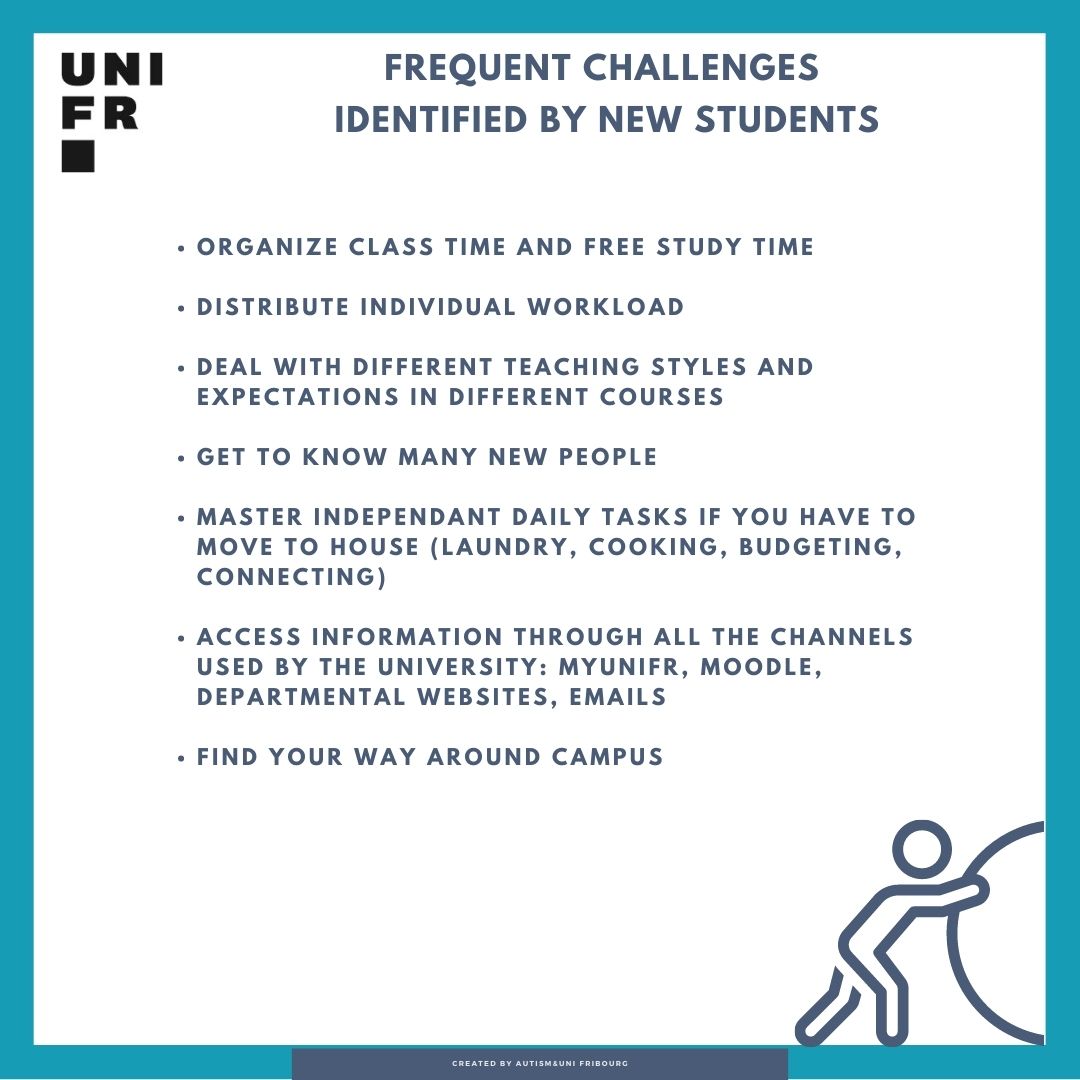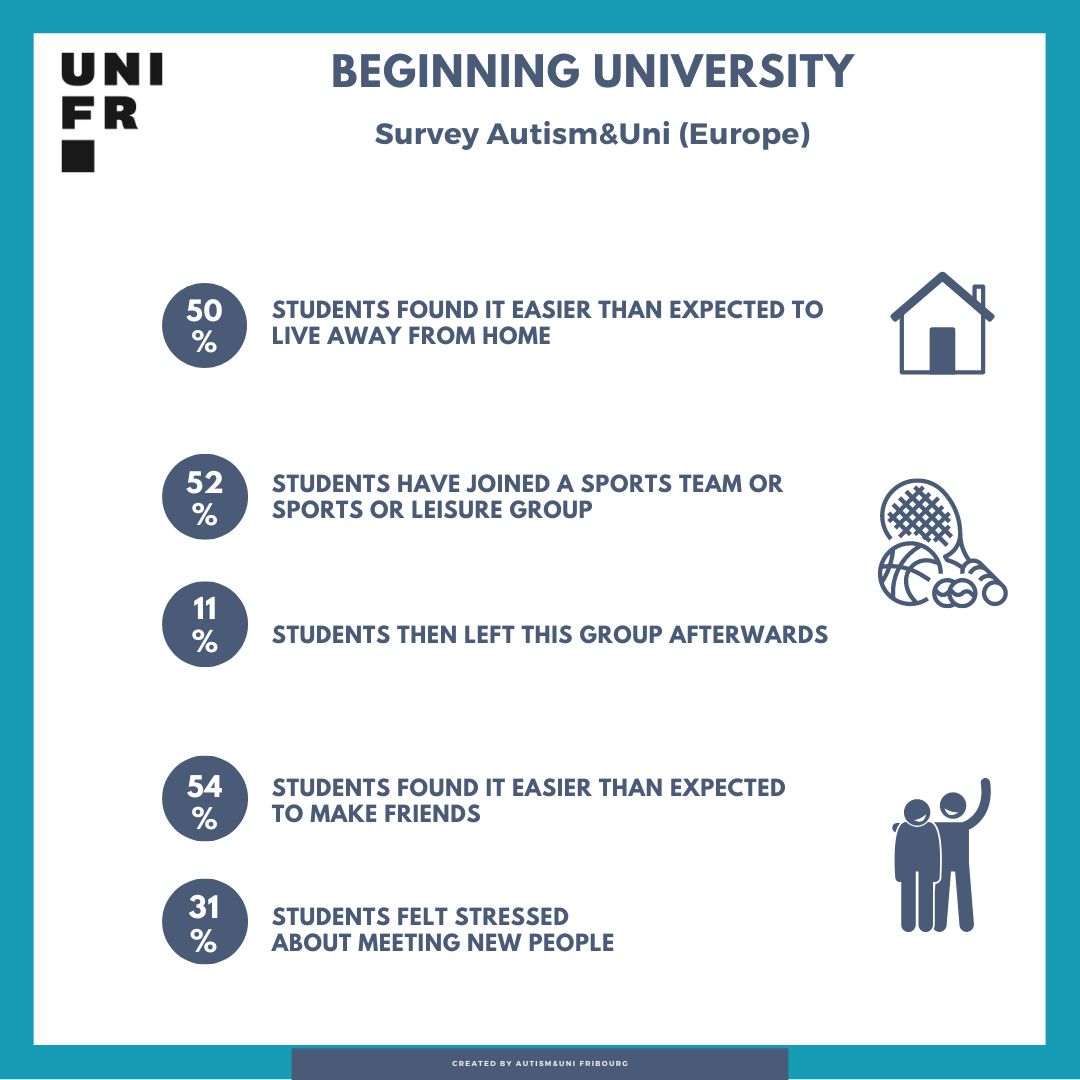It’s hard to understand what the University of Fribourg is like until you get there. This chapter will show you what the University of Fribourg is really like.
Context
“I am terrified of going to university, especially in a city that is far from home, because I don’t like to change my routine at all.” (T., high school student considering enrolling at the university)
“I had a really good experience at university. I had more control over my environment, so I was much happier there than I was at high school. There was a strict schedule in high school, but during breaks there was no schedule at all, and I didn’t know how to handle that. But at university, I could control my own time much more.” (M., former student)
Studying at university is a new and exciting experience for all students.
Before university, many students look forward to becoming more independent, while others are apprehensive about meeting new people, getting used to a new environment and a new way of studying. The truth is that everyone needs some time to adjust. So how do you prepare for university?
One of the best things about university is that no one is watching you or telling you what to do. But that’s also the most disorienting thing. At university, much of your study is “self-directed”: this means that you are expected to learn independently and are responsible for planning your schedules, organizing your individual work, and meeting deadlines for assignments or exam preparation.
This independence can be liberating, but it requires organization skills that most students don’t have at the beginning of their studies.
Here are some common challenges faced by new students:
What does that have to do with me?
“I have problems planning and managing my life. The idea of working independently is still difficult for me.” (J., Student hesitating to enroll in university)
“Everyone says you have to decide for yourself to really experience university. But for students on the autism spectrum, this advice is no good. At Uni, there is no safety net to monitor students and their progress” (Current Student)
Academic freedom:
At university, all students are considered free and independent adults. Students are advised to come to all face-to-face classes, but no one will call them to find out why they are absent if they don’t come. This is called academic freedom. For some students, this freedom is a huge relief. For others, clear regulations would be more reassuring.
The same applies to the organisation of studies: generally speaking, there are no intermediate tests during the semesters. In most cases, there is a period of six months (one semester) or a year (two semesters) between the start of a course and the examination.
To prepare for university with this academic freedom, getting used to planning tasks and appointments with a diary can help to structure work, and therefore to reassure. In the section learning strategies, you will find simple ideas to create a learning routine.
Fribourg is known to be a student city. In fact, it is THE student city in Switzerland. Even if Miséricorde remains the main historical site, there are many other places in the city that belong to the University and in which there are classrooms, libraries, offices or other useful places for students.
At first, everyone gets lost in the buildings of the University of Fribourg. In the Places and orientation section, you will find out how to find your way.
What is the next step?
Take a walk through the buildings of the University of Fribourg before the start of your studies to see where everything is.
Practical advice
- Think about how you will manage your time
- Familiarize yourself with the use of a calendar
- Find places where you can study in peace (see also the chapter on quiet libraries)
- The very first class of each unit is very important. Make sure to participate in it if at all possible. Most of the time, the first class is when the teacher gives the instructions for the course and the exam
- After the first class, take the time to recap all of the expected work and schedule the individual work to be done during the semester
- Note these steps in your agenda
- If you have to move house to start university in Fribourg, take the time to discover your new environment before your studies: useful shops, public transport, the organisation of common living spaces in your flat (such as the laundry room or shared kitchen)
- If you are not used to living without your parents, practice daily living tasks: shopping, preparing meals, developing a plan to manage laundry and housework, planning and managing a budget
- Take a walk around the university buildings before class to find out where the rooms are
- Be kind to yourself: everyone gets lost at least once when looking for a room
- If you have not yet decided on your course of study, the chapter on choosing a course of study at the University will help you
- If you have any questions, you can contact the Autism&Uni team at any time using the contactform
- CONTACT
Questions to ask yourself
- If you have to move house to study at the University of Fribourg, do you know how to prepare simple meals, do your laundry and manage your finances?
- Do you have effective strategies for note-taking and exam preparation?
- Are you familiar with the use of a calendar?
- Will you be using public transport, and do you know which main connections you will need?
- Have you already made a budget and considered all the options for obtaining financial support?
- Have you already decided on your course of study?
Additional information
CONTACT
About the author
Edited by: Nathalie Quartenoud ©
Translated by: Daniel Dukes


 Back
Back 
